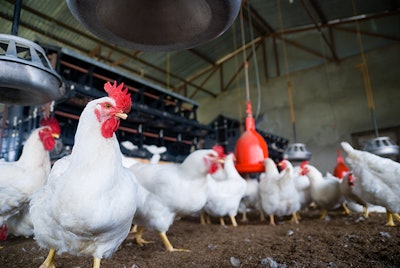
Necrotic enteritis typically develops as a complication of other diseases, like coccidiosis, that impact intestinal function or cause immunosuppression. Coccidia vaccines can help prevent both diseases in chickens and turkeys.
Other diseases that can cause intestinal damage include ascarid migration, hemorrhagic enteritis in turkeys, infectious bursal disease and severe Salmonella infections.
Sudden changes in feed formulation, such as the addition of high levels of fish meal or wheat, can disturb the intestinal microflora, leaving the gut vulnerable to infection.
Intestinal damage allows C. perfringens, a normal inhabitant of the intestinal tract, to attach, proliferate and produce toxins. C. perfringens is a gram-positive rod bacteria.
How to diagnose necrotic enteritis
Necrotic enteritis is an acute infection caused by the bacteria Clostridium perfingens.
Clinical signs of the disease begin with the acute onset of depressed, ruffled birds followed by distended intestines with necrosis of the intestinal mucosal and sudden death. Necrotic enteritis is characterized by a sudden increase in mortality.
Subclinical cases of necrotic enteritis are harder to diagnose. Symptoms include reduced weight gain, wet droppings and increased feed conversion ratios.
There are several strategies for preventing and controlling necrotic enteritis.
Vaccination or antibiotic treatments against predisposing factors
Vaccination against coccidiosis and the other diseases that predispose poultry to the development of necrotic enteritis can reduce the risk of the bacterial infection.
The coccidiosis vaccine exposes birds to drug-sensitive strains of live coccidia and is administered by water-based spray, gel spray or gel drop, typically at hatch. This timing gives birds a coccidiosis challenge earlier in their life, rather than later in the poultry house, which is less costly in terms of lost performance.
C. perfringens usually responds well to the same antibiotics specified for ulcerative enteritis, including bacitracin, penicillin and lincomycin, although identifying the specific medication to use depends on the predisposing condition.
Nutritional strategies to manage gut health
In antibiotic-free poultry houses, probiotics, plant-based compounds and other nutritional management strategies can help the birds maintain a healthy gut flora to limit the negative impact of necrotic enteritis.
Litter management
Proper litter management is also important, alongside rigorous cleaning and disinfection prior to the introduction of a flock into a poultry house. These measures help prevent any predisposing conditions, therefore controlling necrotic enteritis.


















